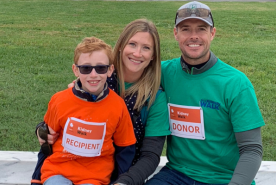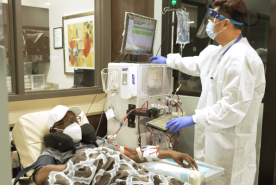Many people who need transplants of organs and tissues cannot get them because of a shortage of donations. Every month, more than 2,000 new names are added to the national waiting list for organ transplants. About 16 or 17 people die every day while waiting for a transplant of a vital organ such as a kidney, heart or liver.
Here are the facts
- Thousands of successful organ and tissue transplants take place each year. Kidney and corneal transplants are the most common, but new drugs and improved techniques are increasing the numbers of heart, liver, pancreas, lung, bone and other types of transplants.
- Most organs and tissues are donated by individuals at the time of death. This is called non-living donation.
- Organs and tissues for transplantation may also come from living donors, who are usually blood relatives of the recipient. Living donation is possible in cases of kidney or bone marrow transplant. The names of all those waiting for transplants from non-living donors are placed on a waiting list until suitably matched organs become available. Donated organs are matched with individuals on the waiting list according to factors that include blood and tissue types, medical need, length of time waiting, and size and weight of the donors and recipients.
- If you are 18 years of age or older you may become a donor by signing a Uniform Donor Card or the organ donor declaration on your driver's license. If you are younger than 18, you may become a donor if your parent or a legal guardian gives consent. People who are 65 years of age or older may be acceptable donors, particularly of corneas, skin, bone and for total body donation.
- One donor can benefit many other people. Organs and tissues that can be transplanted include the kidneys, corneas, heart, heart/lungs, liver, pancreas, heart valves, bone, bone marrow and skin. You may specify what organs and/or tissues you wish to donate on your Uniform Donor Card or on your driver's license.
- Most states have passed required request laws. These require hospitals to have a system in place for asking the family members of someone who has died to consider donating their loved one's organs and tissues. The family members must sign a consent form before donation can take place even if the person had indicated the desire to be a donor by signing a Uniform Donor Card or the organ donor declaration on his or her driver's license. That is why it is so important to tell your family members about your decision to be a donor.
- Religious leaders the world over favor such donations as expressions of the highest humanitarian ideals. This gift of life is consistent with the principles of most religious and ethical beliefs. If you have questions about your religion's position concerning organ and tissue donation, consult your minister, priest or rabbi.
- Medicare covers many of the costs associated with kidney transplants for those who are eligible, regardless of age or financial status. Medicare also covers expenses of heart, heart/lung, lung, liver, cornea and bone marrow transplants for patients who have certain medical conditions. Currently, Medicare does not cover pancreas, bowel or intestinal transplants, but some private insurers may help to pay the costs of these transplants. Medicare will cover the kidney portion of a kidney/pancreas transplant if the patient can pay for the pancreas portion or is covered for this by a private insurer.
- The donor and the donor's family do not pay for any of the expenses associated with organ and tissue donation.
- You can change your mind after signing a donor card by simply discarding the card and telling your family members and loved ones that you have done so.
- It's easy to become a donor. Simply sign a Uniform Donor Card. It is a legal document under state law through which you can express your wishes about donating organs and tissues. You may obtain a card at your local National Kidney Foundation affiliate. Carry the card with you at all times. Be sure to discuss your decision with your family members or other loved ones.
What else can you do to advance this life-sustaining and life-enhancing program?
Be sure to tell others about the organ donor program. Your local National Kidney Foundation affiliate will be pleased to provide you with more information and additional Uniform Donor Cards.
If you would like more information, please contact us.
© 2015 National Kidney Foundation. All rights reserved. This material does not constitute medical advice. It is intended for informational purposes only. Please consult a physician for specific treatment recommendations.
















